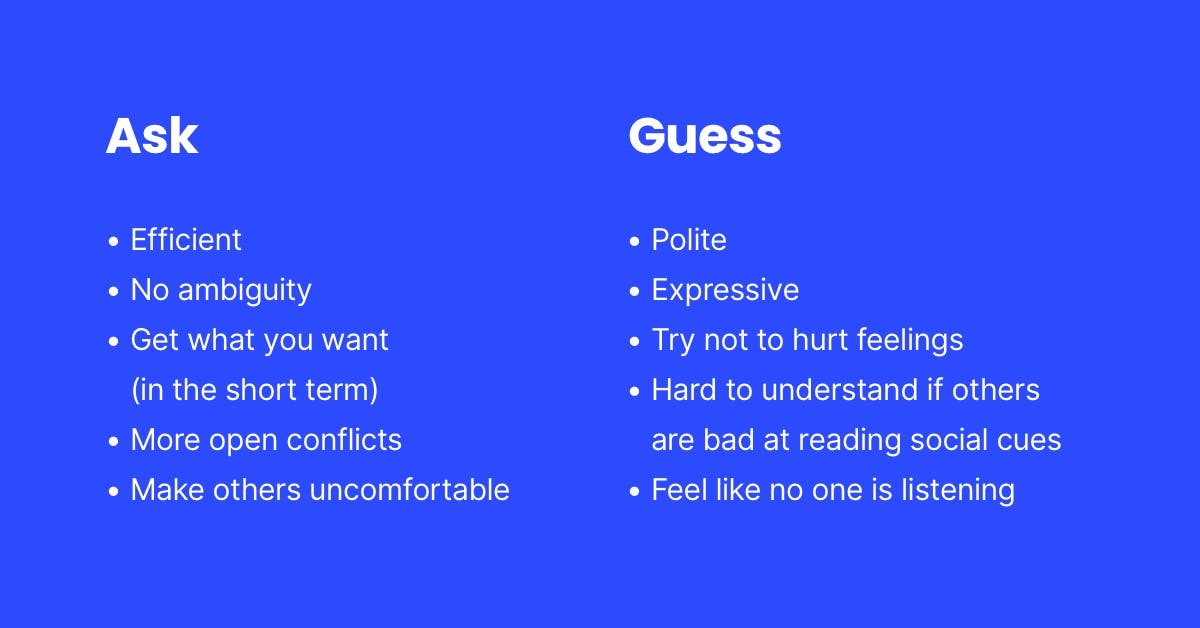marketing
Ask Vs Guess Marketers
Written on 12 September 2021
When someone asks you for a backlink and you are not inclined to give them, how do you usually respond?
Whatever. I'll just say no.
Or...
Urgh, why is this person so direct? I don't even know you. How do I reject him politely?
If the former is your reaction, you are likely more of, what I would call, an ask marketer. The latter, a guess marketer.
Ask and guess are two different communication styles, which apply to all communications in life, with your partner, colleagues, and friends. And I think it can be applied to marketing relationships too.
Understanding the differences between the two communications styles can give you an advantage in forming partnerships.
Ask vs guess cultures
Katherine Wu gave a great talk on this several years ago. If you want to get a comprehensive explanation of the two cultures, I'd recommend watching her 30-min talk. Otherwise, here's a short, incomplete summary:
Say, you walk into a room and see your friends play a board game.
If you are from the ask culture, you would simply ask, "Can I join?" And you would be ok if your friends say "no". No big deal.
If you are from the guess culture, you might say, "This looks interesting." You avoid asking unless you are confident they will say "yes" because you don't like to impose on others. So you put out feelers. In the best-case scenario, your friends would invite you to play without you having to ask explicitly.
Neither is better than the other; they are just different. Each has its advantages and disadvantages.

People from the ask culture get things done efficiently. There is no ambiguity. They get what they want (at least in the short term). But they will get into more open conflicts and can make others feel uncomfortable.
People from the guess culture are more polite and expressive. They try not to hurt one another's feelings. But they can be hard to understand if others are bad at reading social cues. They might feel like no one is listening to them.
Ask or guess isn't a dichotomy, though. It is more of a spectrum. And our behavior can vary in different contexts.
Marketing relationships
I suspect most marketers in the past were from the ask culture. When advertising was the dominant form of marketing, you had to sell to get results. David Ogilvy believed that ads have to sell. That probably attracted more people from the ask culture than the guess culture. Selling would feel too confrontational to people from the guess culture.
But as content marketing became popular over the last few years, marketers' attitude towards selling seems to be shifting. Many now think we should provide value, not sell directly. This likely made people from the guess culture more comfortable working in marketing.
With the mix of ask marketers and guess marketers, understanding the differences in communication styles becomes an advantage when forming partnerships. While the details of the partnership are important, a partnership is ultimately two people—two humans with their own communication style and emotions—deciding whether they want to work together.
Consider these four scenarios:
- If an ask marketer approach another ask marketer, the conversation would be efficient and direct. "Want to partner? Yes/no. Done."
- If an ask marketer approach a guess marketer, the guess marketer would find it too direct.
- A guess marketer wouldn't approach others directly. If the other person is an ask marketer, he likely would miss the social cues that the guess marketer is interested in collaborating.
- If the other person is also a guess marketer, she is more likely to pick up the social cues than an ask marketer, which could lead to a partnership.
Neither the ask approach nor the guess approach is better. While the ask marketer could risk annoying the other person by being too direct, the guess marketer could lose the chance to collaborate by being too indirect.
I'm more of a guess marketer. If you tell me in your first email to me that we should collaborate, my reflex is to be wary and scrutinize your pitch. But if we have interacted, I know you enough, and I like your work, I would happily link to your articles, share your work, and find opportunities for you—without you asking.
How to use this
Ask marketers, not everyone would appreciate the direct approach. If you made a pitch and the person replies with something like, "yeah, let me think about it." That likely means a no. Don't keep pushing it.
Guess marketers, at some point, you just need to ask because others might never pick up your social cues and make you an offer.
As a guess marketer, my approach is to always put out feelers first. I would (almost) never go for an ask right away. In fact, I usually don't even think about partnerships until I think I know the other person well enough. In general, I like to talk to other marketers, so I'm always checking out people's work, reading and replying to their tweets, and hoping to make friends.
If I feel like a partnership would be mutually beneficial, I would try to drop more and more obvious hints. Ask marketers would eventually pick them up and ask me. Otherwise, I would pluck up the courage to ask. This is not efficient but I like what Stephen Covey wrote in The 7 Habits of Highly Effective People:
Again, you simply can’t think efficiency with people. You think effectiveness with people and efficiency with things.
This is my approach anyway. And ask marketers would probably advise you otherwise.
How do you approach partnerships? Let me know... so that I don't have to ask you directly whether you are an ask marketer or guess marketer. ;)